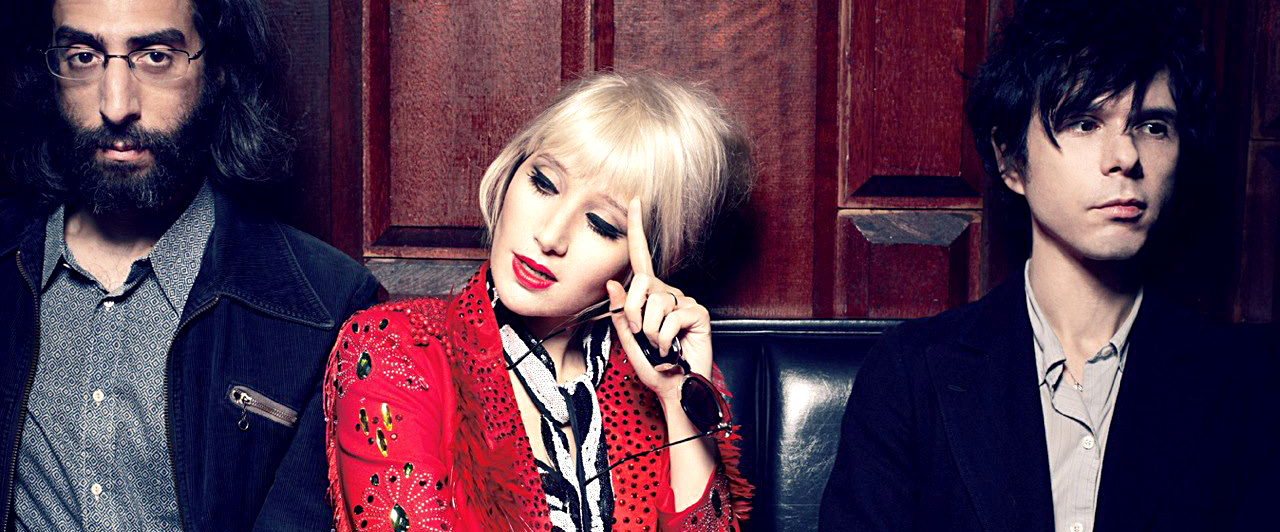
How a band reacts to reaching its peak might be more interesting than the peak itself. TV On the Radio, for example, followed up its world-conquering 2008 record Dear Science with a bright, consistent and even more accessible pop-soul effort, Nine Types of Light, which fully solidified the group’s position as both a critical darling and friend to the masses.
The similarities between TV On the Radio and Yeah Yeah Yeahs, the latter of whose fourth record Mosquito dropped today, don’t just stop at their shared New York area code. As of today, both groups are four albums deep. Both appeal to fans of thoughtful but gut-punching indie rock. And both released utterly fantastic third records in the late 2000s which featured career-making blends of critical and popular appeal.
But with today’s release of Mosquito, this shared trajectory seems to have split. Rather than simply put out a logical continuation of that esteemed LP#3, It’s Blitz, Yeah Yeah Yeahs has gone in a much wilder direction, with a sassy, loud and eclectic fourth record every bit as colorful, noisy (and sometimes jarring) as its almost unbelievably hideous cover art (see above). And while there’s nothing necessarily wrong with that strategy, Mosquito feels like a record split between being a pleasing continuation of the sound perfected on It’s Blitz, and a compilation of one too many failed experiments. Altogether, it’s a decent but wildly inconsistent record, and we’ve really come to expect more from the band – Yeah Yeah Yeahs may be miles ahead of its contemporaries, but Mosquito feels like a firm step in the wrong direction.
Opener and lead single “Sacrilege” demonstrates this unfortunate duality all too perfectly. Over a raucous beat and soulful chorus, Yeah Yeah Yeahs remind us in short order of its tight instrumentation and Karen O’s fantastic vocal abilities – within moments, she can go from singing with a delicate feminine beauty to shouting her lungs off. For the first couple minutes, “Sacrilege” feels like a winner, but the song’s tightly controlled crescendo is eventually overwhelmed by a repetitive and garish gospel choir – rather than adding some soulful authenticity, the effect is akin to dumping nutella over a $15 gelato dessert, and feels more like a spectacle than anything else.
This reliance on spectacle gives Mosquito a try-hard vibe, which is odd for such an established band – you can’t help but wonder: who are Yeah Yeah Yeahs trying to impress? After the gospel monstrosity that is “Sacrilege,” we’re treated to an odd rap collaboration with Dr. Octagon (“Buried Alive”), an utterly dreadful and boisterous title track, some ill-informed roots reggae (“Under the Earth”) and a thoroughly head scratch-worthy alien-themed song (“Area 52”). It’s that title track that might be most disappointing, as it nonsensically drives home the mosquito metaphor beyond all reasonable doubt – “Mosquito sing / Mosquito cry / Mosquito live / Mosquito die / I’ll suck your blood / Suck your blood / Suck your, suck your, suck your blood” – Karen, we get it. Mosquitos suck blood. The fact that we waited four years for such uninspired songwriting sucks a lot more.
These missteps are really quite a shame when juxtaposed with some of the record’s subtler tracks, which are generally wonderful. Second track “Subway” is an elegant slow-burning love song set on a New York City subway that masterfully captures the feeling of missed connections all too common in city life: “I lost you on the subway car / Got caught without my MetroCard / Waiting, waiting for the express train / Gonna catch up with you wherever you are / I waited, and I waited.” Even more impressive might be the song’s clever use of subway train sounds as its sole percussion track – it’s hard to believe such a subtle and thoughtful track made its way onto such an ostentatious record.
The album’s final two tracks are similarly fantastic – “Despair” captures an ironic combination of hope and gloom, and Karen O’s slightly southern croon over a propulsive percussion track makes the song sound like something The Killers might roll out if The Killers still made good music. And closer “Wedding Song” is nothing short of majestic, with expansive guitars, synths, thick toms and Karen O’s voice sounding more beautiful than ever, as she repeats the album’s most romantic and human line: “You’re the breath that I breathe.”
It’s these high points that make Mosquito seem all the more disappointing. Much will be said about this album’s variety, but Yeah Yeah Yeahs fare far better when sticking to the sound that made the group’s previous record such a success (ironically, the more Yeah Yeah Yeahs try to innovate, the less innovative the band sounds). Such wide-eyed experimentation might be okay for a young band, but after 13 years, both the band members and their listeners are getting far too old for this.











